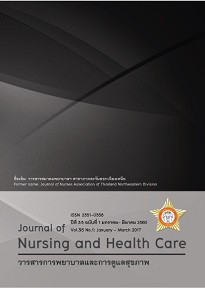ประสบการณ์การปรับตัวของผู้ดูแลในการดูแลกิจวัตรประจำวันผู้สูงอายุสมองเสื่อมในชนบท The Caregivers Experiences in Self Adaptation of take care of Activity Daily Living (ADLs) of Elderly dementia in rural context
คำสำคัญ:
ประสบการณ์ การปรับตัว ผู้ดูแล ผู้สูงอายุ กิจวัตรประจำวัน สมองเสื่อม experience, self adaptation, caregivers, activities of daily living (ADLs), dementiaบทคัดย่อ
บทคัดย่อ
การวิจัยเชิงคุณภาพนี้มีวัตถุประสงค์เพื่อศึกษาประสบการณ์การปรับตัวของผู้ดูแลในการดูแลกิจวัตรประจำวันผู้สูงอายุสมองเสื่อมในชนบท ผู้ให้ข้อมูลหลักเป็นผู้ดูแลผู้สูงอายุสมองเสื่อมระยะที่ 2 คัดเลือกแบบเฉพาะเจาะจงตามคุณสมบัติที่กำหนด รวบรวมข้อมูลด้วยวิธีการสัมภาษณ์เชิงลึก การสังเกตแบบมีส่วนร่วม และวิเคราะห์ข้อมูลโดยการวิเคราะห์เชิงเนื้อหา
ผลการศึกษา ประสบการณ์การปรับตัวของผู้ดูแลในการดูแลกิจวัตรประจำวันผู้สูงอายุสมองเสื่อมในชนบท จำนวน 8 ราย ผลการวิเคราะห์ ประกอบด้วย 3 ประเด็น คือ 1) การปรับเปลี่ยนตารางชีวิต ได้มีการจัดสรรเวลาเพื่อทำหน้าที่เป็นผู้ดูแลหลัก รวมทั้งให้สามารถดูแลตนเอง ประกอบอาชีพ และเข้าร่วมกิจกรรมทางสังคมตามความเหมาะสม 2) การปรับเปลี่ยนวิธีคิด ผู้ดูแลมีความรู้เกี่ยวกับพยาธิสภาพ อาการและอาการแสดงของภาวะสมองเสื่อม ทำให้ผู้ดูแลเข้าใจและยอมรับพฤติกรรมที่ผู้สูงอายุสมองเสื่อมแสดงออกรวมทั้งทำใจ และปล่อยวาง 3) การจัดการปัญหาสุขภาพ ผู้ดูแลได้จัดการผลกระทบที่เกิดกับตนเองทางด้านร่างกายเพื่อให้อาการทุเลา หรือไม่มีภาวะแทรกซ้อนในกรณีที่มีโรคประจำตัว และด้านจิตใจ เพื่อลดอาการท้อแท้ เบื่อหน่าย และความเครียด
ข้อค้นพบจากการศึกษาครั้งนี้ทำให้เข้าใจประสบการณ์ของผู้ดูแลในการดูแลกิจวัตรประจำวันผู้สูงอายุสมองเสื่อมได้ดีขึ้น และสามารถใช้เป็นแนวทางสำหรับผู้ดูแลที่ไม่สามารถปรับตัวได้เหมาะสม หรือไม่สามารถเผชิญปัญหาได้อย่างมีประสิทธิภาพ
Abstract
The purpose of this research was to describe the self adaptation experiences of caregivers who took care of activity daily living (ADLs) in elderly persons with dementia in rural context. A qualitative method was applied in the study. The participant selection used purposive sampling which it complied with inclusion criteria. The main informants were eight caregivers who took care of elderly persons with dementia in stage 2. Data collection used in- depth interview and participant observation . Content analysis was employed in data analysis.
The results showed that; three main themes emerged from the self adaptation experiences of caregivers who took care of ADLs in elderly persons with dementia. Firstly, to adapt their life schedules: to take care of activity daily living (ADLs), to make a living, and to participate in social activities. Secondly, to change their way of thought: understand the signs of the disease, and accept the expressive behavior of elderly persons with dementia. Finally, to release signs or complications of physical health problems, and to reduce mental health problems such as burnout, boredom and stress .
Research findings of this study lead to be better understanding of the experiences of caregivers who took care of ADL in elderly persons with dementia . The information can be used as guideline of caregivers who cannot accept their roles as caregiver.



